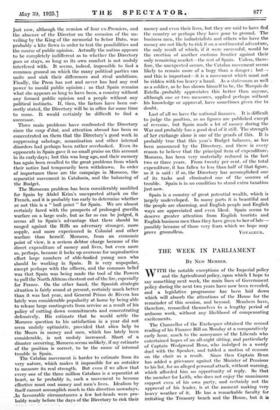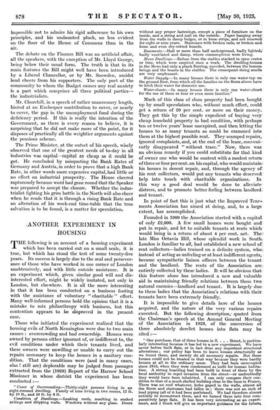THE WEEK IN PARLIAMENT
BY NEW MEMBER.
WITH the notable exceptions of the Imperial policy and the Agricultural policy, upon which I hope to say something next week, the main lines of Government policy during the next two years have now been revealed, and a legislative programme has been laid down which will absorb the attentions of the House for the remainder of this session, and beyond. Members have, therefore, reconciled themselves to a lengthy period of arduous work, without any likelihood of compensating excitements.
The Chancellor of the Exchequer obtained the second reading of his Finance Bill on Monday at a comparatively early hour, much to the annoyance of the Liberals who entertained hopes of an all-night sitting, and particularly of Captain Wedgwood Benn, who indulged in a wordy duel with the Speaker, and •tabled a motion of censure on the chair as a result. Since then Captain Beim has added a grievance against the Minister of Pensions to his list, for an alleged personal attack, without warning, which afforded him no opportunity of reply. So that the member for Leith, who does not enjoy the unanimous support even of his own party, and certainly not the approval of his leader, is at the moment making very heavy weather of it. He has a remarkable faculty for irritating the Treasury bench and the House, but it is impossible not to admire his rigid adherence to his own principles, and his undaunted pluck, no less evident on the floor of the House of Commons than in the air.
The debate on the Finance Bill was an artificial affair, all the speakers, with the exception of Mr. Lloyd George, being below their usual form. The truth is that in its main features the Bill might well have been introduced by a Liberal Chancellor, or by Mr. Snowden, amidst loud cheers from his supporters. The only part of the community to whom the Budget causes any real anxiety is a part which comprises all three political parties— the industrialists.
Mr. Churchill, in a speech of rather unnecessary length, hinted at an Exchequer contribution to cover, or nearly to cover, the gap in the unemployment fund during the deficiency period. If this is really the intention of the Government, as there is every reason to believe, it is surprising that he did not make more of the point, for it disposes of practically all the weightier arguments against the pensions scheme.
The Prime Minister, at the outset of his speech, wisely observed that one of the greatest needs of to-day in all industries was capital—capital as cheap as it could be got. He concluded by misquoting the Bank Rates of Germany and Austria, in order to prove that a high Bank Rate, in other words more expensive capital, had little or no effect on industrial prosperity. The House cheered rapturously because word had gone round that the Speaker was prepared to accept the closure. Whether the indus- trialist fighting his grim battle in the North will also cheer when he reads that it is through a rising Bank Rate and an alteration of his week-end time-table that the true salvation is to be found, is a matter for speculation.











































 Previous page
Previous page